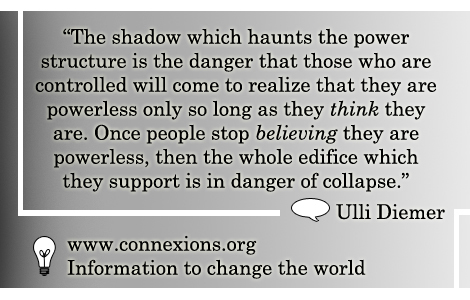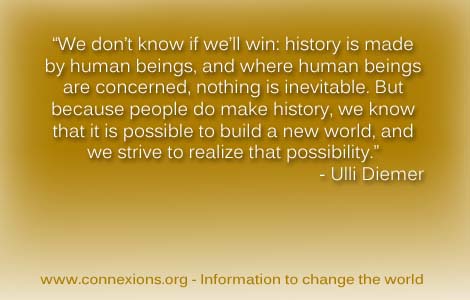
Ulli Diemer — Radical Digressions
Articles Lists
- Selected Articles
- Articles in English
- Articles in French
- Articles in Spanish
- Articles in German
- Articles in Other Languages
- Articles A-Z
- RSS feed
- Subject Index
Selected Topics
- Alternative Media
- Anarchism
- Bullshit
- Capital Punishment
- Censorship
- Chess
- Civil Liberties
- Collective Memory
- Community Organizing
- Consensus Decision-making
- Democratization
- Double Standards
- Drinking Water
- Free Speech
- Guilt
- Health Care
- History
- Identity Politics
- Interviews & Conversations
- Israel/Palestine
- Libertarian Socialism
- Marxism
- Men’s Issues
- Moments
- Monogamy
- Neo-Liberalism
- New Democratic Party (NDP)
- Political Humour/Satire
- Public Safety
- Safe Spaces
- Self-Determination
- Socialism
- Spam
- Revolution
- Trotskyism
Snippets
The energies of much of the left are devoted to issuing appeals to the capitalist state to fix our problems, or to looking for ways to fix the state as if it had somehow accidentally gone off track. The left has always been attracted to the state the way a moth is attracted to a flame, and the darker it gets, the more it is attracted to statist and nationalist illusions.
Thinking About Self-Determination
We need only look at activities of the thousands of people
working in grassroots groups across this country, and around the
world, to see that people do join with others to block
what they see as harmful and to fight for what they consider to
be desirable and just. When they do, that which seemed impossible
to achieve starts to become possible.
What Do We Do Now?
Blogs & Notes
- Latest Post
- Notebook 11
- Notebook 10
- Notebook 9
- Notebook 8
- Notebook 7
- Notebook 6
- Notebook 5
- Notebook 4
- Notebook 3
- Notebook 2
- Notebook 1
Compilations & Resources
- Connexions
- Other Voices newsletter
- Seeds of Fire
- Alternative Media List
- Manifestos & Visions
- Marxism page
- Socialism page
- Organizing Resources
- People’s History, Memory, Archives
- Connexions Quotations page
- Sources
- What I’ve been reading
- What I’ve been watching

Against All Odds
By Ulli Diemer
Some years ago sociologists investigating work place satisfaction studied a particular factory. Having interviewed workers and analyzed detailed questionnaires, the experts published their conclusion that ‘workplace alienation’ was a myth: the workers in this factory, at least, were thoroughly happy at work.
Scarcely had the ink dried on the learned journal than the workers at the factory in question were out on a wildcat strike, physically ejecting managers and running up the red flag of revolt.
The incident captures neatly some of the contradictions which bedevil the ‘managed society’. Here is a form of social organization which circles the globe, penetrating everywhere - societies calling themselves Socialist or Non-aligned as well as those styled Western or capitalist - claiming to be uniquely qualified to manage everything. Yet everywhere managing to produce crisis heaped on crisis.
The managers and experts prescribe their standard cures: more centralized management, more manipulated ‘participation’, more efficiency, more power to the powerful. Yet those who control all the levers of power find that the levers do not respond as planned, or do not respond at all. The more power the system takes unto itself, the more the crises deepen, the more unmanageable the managed society becomes.
The basic contradiction of the managed society is its complete dependence on the co-operation and allegiance of the very people whom it manages. If the system is to work, people have to be made to ‘manage’ themselves. Because Big Brother cannot be everywhere at once. he has to delegate the watching, manipulating and enforcing – to the various breeds of specialist who are a hallmark of the managed society, but finally to each one of us. We must carry our own Thought Police in our heads. But can we be trusted to do so?
The shadow which haunts the power structure is the danger that those who are controlled will come to realize that they are powerless only so long as they think they are. Once people stop believing they are powerless, then the whole edifice which they support is in danger of collapse.

Perhaps nowhere has this been more obvious than in the countries of Eastern Europe, where the system of social control, while crude by Western standards, is the most total to be found anywhere. Here the hope of achieving change seems to have been rooted out of the thinking of an overwhelming majority. Here the state asserts the right to manage every aspect of society down to the smallest detail. It commands almost total control of resources: the economy, the education system, the media, youth groups, recreational activities, cultural organizations, military power. Yet these monolithic societies have been shaken from time to time by revolutionary explosions that have paralyzed the power structure or have even swept it aside entirely. The state’s total monopoly of power and the complete powerlessness and resignation of people. has been turned almost instantly into their opposities – in the Berlin of 1953, the Poland and the Hungary of 1956, the Czechoslovakia of 1968, and the Poland of Solidarnosc in 1980. Only the actual or threatened use of the armed forces of the neighbouring superpower was able to restore the rulers to their supposedly unchallengeable place. During these explosions people who had no hope or thought of rebellion suddenly came together to set up workers’ and neighbourhood councils, alternate networks for the distribution of food, armed self-defense groups, revolutionary trade unions.
At these times, as in France in 1968 or Portugal in 1974, the perception of who was powerless and who powerful changed suddenly. As the perceptions changed, so did the realities of power. It is not that revolt is always lurking just beneath a tranquil surface, but that those who are managed are as ambivalent and contradictory as the society to which they belong. What they - what we - believe and do is a patchwork of contradictions swayed by fluctuating expectations, stretched and pulled by a host of differing messages and emotions, inner needs, learned responses and decisions.
The managed society works certainly because it is powerful and effective. It also works because it invades that part of human nature which is susceptible to being controlled. That part of each of us which is passive and afraid of freedom and change seeks to abdicate responsibility and to content itself with the safe and unchallenging. But the countervailing desire, for a life which is truly free and shatters the bonds of compromise and passivity, survives and at times bursts out.
The majority is excluded from making decisions and therefore from engaged participation. This powerlessness at the bottom and in the middle inevitably works its way to the top. Our normal and expected practice is to ‘work to rule’ by performing strictly our assigned functions. This is because we have neither the power nor after a while the interest to question the direction and goals of our workplaces. The job of most of us becomes to ‘do our job’. The desire to really do anything, to actually solve problems, evaporates. A system which wilfully excludes the best energies and ideas of most of its members, extracting only those human qualities it considers ‘useful’ and suppressing, ignoring or distracting the rest - is inherently irrational in a way that ultimately overtakes those who rule over it.
Thus we find Presidents in the United States and General Secretaries in the Soviet Union expressing their frustration at their lack of power to solve the problems which plague the nations they rule. Bankers fear ruin at the hands of Third World countries hopelessly indebted to them. Ministers of finance in the richest as well as the poorest countries lose all control over the deficit in their own budgets. Corporate executives complain of recession, inflation and uncontrolled interest rates which undermine their investments but which are the chronic products of the economic system they dominate.
Those of us - the vast majority – whose lives are ravaged by these failures of the managed society do not respond only with the expected passivity and acceptance. We fight back, in small ways and large. We attempt despite the odds to assert our own desires and goals and create autonomous spaces for ourselves, sometimes without even being aware that that is what we are doing.
The natural drive of managers is to fragment and isolate us, to break down all non-instrumental’ bonds of family, friendship, community, tradition and work. But the paradox is no society can survive without such bonds. So in undermining them it ultimately undermines itself. Such ties are an instinctive and essential part of living. So there are astonishing numbers of independent and spontaneous efforts to recreate community and association at the grass roots of social life. The (American) encyclopaedia of Associations, for example, lists dome 14,000 voluntary associations. A German directory of groups that specifically describe themselves as ‘alternate’ runs to 500 pages. A similar American directory list 5,000 ‘alternate’ groups. Even anarchists have organized themselves into 1,500 groups around the world.
Despite the pervasive feeling that ‘nothing can be done’ because of the weight of the system with its monopoly of money, resources, land, public space and human energy, people do join together with others to unlock what they see as harmful and to fight for what they consider desirable.
The degradation of our environment, especially, has roused many to fight against pollution, waste dumps, nuclear power, and all the other ills spewed out by industrial society. Despite their efforts environmental destruction continues. But the battles fought by such groups, from the purely local to the international, have made them a factor to be reckoned with. There is no question that the damage which does occur is only a fraction of what we would see if it were not for public outrage.
‘Doing it yourself’ becomes popular and necessary as society organizes itself to a standstill. Quickly and logically doing it yourself grows into doing it with others, sharing skills, building community by discovering that what is most efficient is also often most sociable and pleasant. Some have chosen to ‘return to the land’ or to grow some of their own food. Others seek out and fight to preserve wilderness, or return to using wood stoves, or demand food without chemical additives, or trade their cars for bicycles. Bartering and ‘informal’ economic arrangements prove to be effective and cheaper, with the additional pleasurable garnish of sharing little secrets at the expense of the taxman. Co-operatives band people together to save housing from demolition and keep rents down. Co-operation provides generous scope for the excitements of sharing and squabbling that are accessible only to those who have access to decision-making power. In the workplace people organise against speed-up, dangerous conditions and to have a say about how things are done.
Developments which make it easier for official society to bombard every waking mind with its own messages are also making it easier for ever-growing numbers of people to communicate their won ideas and feelings to each other instead. Video technology puts filmmaking within the reach of those – the poor and dissident – who had no access to it before. Photocopiers and printing break-throughs enable almost everyone to become their own publisher and have helped give birth to astonishing numbers of alternate publications.
The belief that the official society is so overwhelming that nothing can be done about it is very close to the idea that it cannot do anything. The idea that things will nly get done if people get together to do it themselves contains the seed of the idea that people have the power to do everything. People who never question the the inevitability of being assigned to the back of the bus can suddenly grow tired and refuse. This changes reality so much so that it becomes possible to say that, as did Martin Luther King, that ‘those who go to the back of the bus, deserve the back of the bus’ is causing grave concern to generals and political leaders. They see it – rightly – as a challenge to the right and ability of the experts and leaders to decide matters of life and death for all of us. The implications of this challenge threaten to extend – and are extending – far beyond the arms race alone. Already, parts of the peace movement have attempted to subvert national boarders and the blocs themselves. Peace groups in Western Europe are pursuing direct contacts with independent peace groups in the East. The underlying goals is to challenge the tendency of people to see each other as enemies. This begins to create a situation where war preparations become less defensible. It is demonstrated that the warlike policies of the rulers on the other side are actively opposed by many of the same ‘enemies’ whom it is proposed to bomb into annihilation. If the fear that locks people into supporting their ‘own’ government and military can be lifted, then a whole new world seems possible. That which seems possible becomes possible.
First published in the New Internationalist #146 (April 1985 issue). For the article, with accompanying photos, as printed in the New Internationalist, click here.
También disponible en español: Contra Todos los Pronosticos.
Aussi disponible en français: Contre vents et marées.
Subject Headings: Control Systems - Decision-Making - Democracy - Democratization - Eastern Europe - Eastern Europe/Politics - Management - Political Alternatives - Power - Revolution - Social Alternatives - Social Change
